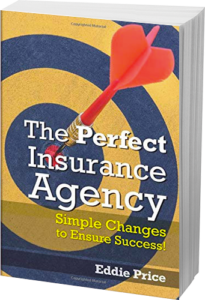“What we dwell on is who we become.”
—Oprah Winfrey
 Many insurance agency owners started out as insurance agents working for an agency. That’s exactly how I started. When they decided to open their own agency and become an entrepreneur, they think it will be easy because they are such good insurance agents. They know insurance backward and forwards so they assume it will be easy to be a successful agency owner. The problem is that there are other moving parts to running a business like leadership, marketing, sales, customer service, and human resources. It’s rare that any one person is great at all of these parts. My point here is that you need to decide what you are great at and identify what you love, which will normally be the same thing, and you need to focus on doing those things well. You should outsource or delegate all tasks that you don’t love or are not great at doing. We hired you away from your teaching career to work in our agency, Carolina Insurance; you were an instant superstar in the areas of customer service, sales and pretty good at marketing. You had little opportunity to be tested in HR or leadership at that point. When we moved you from the agency to Jenesis, you instantly took to sales like a fish to water. So, sales will be an area you will want to stay close to throughout your career and possibly delegate other things like HR and marketing for example. When you delegate, as a leader, you will still be involved, but it will not be your daily focus. Also, just because you are talented in sales doesn’t mean you do all the selling. It just means that if you love it and are great at it like you are, you should spend more time in that area of your business even if it’s in a coaching capacity for other salespeople on your team.
Many insurance agency owners started out as insurance agents working for an agency. That’s exactly how I started. When they decided to open their own agency and become an entrepreneur, they think it will be easy because they are such good insurance agents. They know insurance backward and forwards so they assume it will be easy to be a successful agency owner. The problem is that there are other moving parts to running a business like leadership, marketing, sales, customer service, and human resources. It’s rare that any one person is great at all of these parts. My point here is that you need to decide what you are great at and identify what you love, which will normally be the same thing, and you need to focus on doing those things well. You should outsource or delegate all tasks that you don’t love or are not great at doing. We hired you away from your teaching career to work in our agency, Carolina Insurance; you were an instant superstar in the areas of customer service, sales and pretty good at marketing. You had little opportunity to be tested in HR or leadership at that point. When we moved you from the agency to Jenesis, you instantly took to sales like a fish to water. So, sales will be an area you will want to stay close to throughout your career and possibly delegate other things like HR and marketing for example. When you delegate, as a leader, you will still be involved, but it will not be your daily focus. Also, just because you are talented in sales doesn’t mean you do all the selling. It just means that if you love it and are great at it like you are, you should spend more time in that area of your business even if it’s in a coaching capacity for other salespeople on your team.
Define sales goals
Let’s start off by talking about goals again. Like I said before, it doesn’t make any sense to establish a plan without having goals. How in the world would we know how to create a map if we have no idea of where we want to go?
So let’s decide how much you want to grow this year. This can be based in part on what your sales were last year and in part on the budget that we’ve created. Now work backward to decide what your sales will need to be. When we know what our sales need to be this year, we can then break that down into monthly goals. Now we know what our monthly sales objectives are, which becomes a goal, is measurable, and we can then create the actions steps needed to achieve. Each of these actions steps can be sort of like a mini goal. They can each be measured and have time frames attached.
When setting your goals, decide specifically what you want to measure. Do you want to set your goal to have a specific number of active policies at a specific time? Do you want to have your goal focused more on premiums or more on gross revenue coming into your agency? Do you want to have more home policies, auto, or motorcycle? You may want a combination of these things and that’s great. The important thing is to decide how many policies, and/or customers, and/or how much premium, and/or what your gross revenue will look like at a predetermined time and then create your action steps to achieve that.
I would again create a document much like the marketing plan, where you list your goals and action steps. Documentation can include your marketing because that’s part of what’s required in order to reach your sales goals. But your documentation is especially going to focus on the non-marketing activities you and/or your team have set that will result in you and your team reaching your objectives.
A good exercise might be to start by quickly listing all the activities that an agent can engage in that will result in increased sales. That list may look something like this.
- How to close a sell
- How to improve closing ratio
- How to cross-sell
- How to round accounts
- How to prospect
- How customer service is a sales function
- How to get more referrals
Once you have created a list of ways to improve sales, then go back through the list and move the ones to the top that you believe will get you the best results with the least effort. Remember the 80/20 rule; 20% of our efforts will result in 80% of our successes.
Once you have the top few areas that you want to focus on, document more information about each one.
Closing ratio
For example, if you want to improve closing ratio, you have to start by making sure you are measuring your closing ratio. In our software, we have always been diligent about tracking the quotes by each agent, and which ones have sold. We’re able to calculate a closing ratio and set a goal for improving the ratio in the future. Make a list of action items under that goal that will be implemented to achieve the goal. That list may look something like this:
- Compare the closing ratios of all agents in the office and let those with higher ratios teach others.
- Research how to improve the closing ratio.
- Assign team members the task of researching how to improve.
- Make sure they are quoting all available companies.
When you have created a list of ways to improve closing ratio, for example, one of the ideas I mentioned above is assigning team members the task of researching specific areas, this can be very powerful. After the research has been done, agents can document their findings into a blog and post the blog on your site to share with customers to help them.
Although referrals may be something we work on in our marketing plan, sales and customer service is where we do the work that helps us succeed. So, it’s critical to treat everyone with kindness and always do what’s best for the customer. If you do that and provide a memorable experience, they will want others to benefit from your products and services.
Track and improve closing ratio
When I started my agency, we didn’t have a great way to track our closing ratio. That was ok at first because it was just me for the first year anyway. Less than a decade later, I had created Jenesis, and part of what it did was track every quote and which ones were sold. Presto, we had our closing ratio.
Why is the closing ratio so important?
Think about this. Let’s say you have two agents quoting in your agency. Each of them quotes a few policies each day. So, they may each quote say around 20 policies a week or 80 per month or 1,000 for the year.
Now let’s imagine one of the agents normally closes 40% of their quotes and the other one closes 60%. At the end of the year, the one closing 40% will write 400 policies and the other agent will write 600 policies.
Let’s calculate one more value. How much is a policy worth? What’s the lifetime value of a policy? Let’s say your average premium is $1,000 per year and you get paid 10% commission on average. I hope these are low numbers but they are easy to work with. Now, how long do you keep the average policy? Your system should give you this data. Let’s say you keep the average policy for five years. Our commission on the average policy is $100 per year and we keep the average policy for five years, so the lifetime value of a policy is $500.
Let’s go back to our two agents. The agent that closes 40% of what they quote will write 500 policies and generate $200,000 in commission for your agency. The agent who closes 60% of their quotes will write 600 policies and generate $300,000 in commission for your agency.
That’s $100,000 in additional income generated by one person without spending any more money on marketing.
Key Takeaways
- Define your sales goals.
- Track and improve the team’s performance.
- Account rounding and cross-selling
- To incentivize or not to incentivize
- Implement an ongoing training plan.
- Meet with the sales team.
- Treat everyone with kindness.
- Close deals over the phone.
- You can’t sell what you don’t believe in.
- You need to be passionate about what you are selling.
- Take advantage of sales automation.
- What you pay attention to gets results.
- Seven touches
Suggested Reading
- Sell Your Way To The Top by Zig Ziglar
- Spin Selling by Neil Rackham
- Advanced Selling Strategies by Brian Tracy
- The Ultimate Sales Machine by Chet Holmes
Action Steps
- Schedule training.
- Schedule sales meetings.
- Give at least one compliment today
 This post was excerpted from The Perfect Insurance Agency by Eddie Price. For the full chapter on Marketing, you can purchase the book on Amazon.
This post was excerpted from The Perfect Insurance Agency by Eddie Price. For the full chapter on Marketing, you can purchase the book on Amazon.
